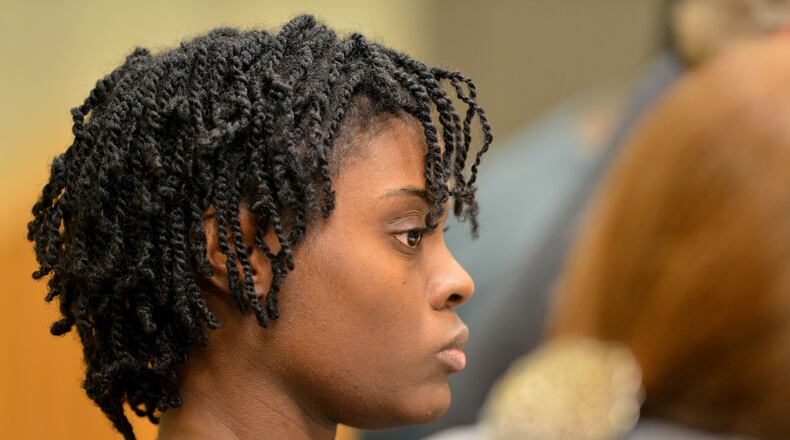A Gwinnett County woman accused of starving her stepdaugher to death said she would rather rely upon divine guidance than the guiding hand of legal counsel. Tiffany Moss is now on track to represent herself at her upcoming death-penalty trial.
On Thursday, the Georgia Supreme Court declined to hear a pretrial appeal that sought to overturn a judge's decision to allow her to serve as her own lawyer. She was accused of starving her 10-year-old stepdaughter Emani Moss to death in 2013. The girl weighed only 32 pounds when her body was found, authorities said.
Moss’s trial, which had been scheduled for this past July, was postponed when Superior Court Judge George Hutchinson allowed two lawyers from the state’s public defender system to appeal his decision allowing Moss to represent herself. The judge will now have to reset her trial date.
Criminal defendants have a right to counsel if they cannot afford to pay for legal representation. They also have the right to represent themselves, although it’s extremely rare for this to happen in a death-penalty case.
During a pretrial hearing, Hutchinson found Moss competent to stand trial. But before granting her request to be her own lawyer, Hutchinson implored her to accept legal representation. At one point, Hutchinson told Moss he had retained a lawyer to represent his daughter when she got a traffic ticket a few years ago.
That was a trivial matter compared to what Moss faces now, he said.
“They are seeking to have you executed, and I can’t be more blunt than to say they are trying to have you killed,” the judge said. “That’s just as serious as it can possibly get and I think it’s best that you have an attorney.”
As a precaution, Hutchinson appointed capital defenders Brad Gardner and Emily Gilbert to serve as standby counsel and represent Moss if she changes her mind. On Friday, Gardner and Gilbert, who had filed the pretrial appeal on Moss’s behalf, expressed disappointment that the high court had declined to hear the case.
“We are extremely concerned about her ability to navigate through this death-penalty trial,” Gilbert said. “At this point, we’re still standby counsel but have gotten no word from her that she wants our assistance. It appears she is willing to rely on God to provide guidance to her. That’s it. And it appears she’s unable to conduct any preparation for trial.”
District Attorney Danny Porter had agreed the state Supreme Court should at least consider the pretrial appeal. Hutchinson, he added, has done as much as he can to warn Moss about the perils of self-representation in a case where the stakes are so high.
“I’m much more comfortable now with the idea we’ve gone out of our way to make sure she understands what she’s doing and the risks that come with it,” he said. “We’ll now go forward with her representing herself.”
At a previous court hearing, Moss acknowledged she had not been reviewing the evidence against her or putting together a list of witnesses who would testify on her behalf. Instead, she said, she was getting ready “in a more spiritual way than, you know, a physical way.”
Despite Hutchinson’s attempts to persuade her to get a lawyer, Moss has held firm.
“I’m confident in my decision and I’m standing by it,” she told the judge.
Reluctantly, Hutchinson acceded to her wishes. But he also allowed the state Supreme Court to scrutinize his decision before the trial.
The state Supreme Court was unanimous in deciding not to hear the appeal and the justices said they had thoroughly reviewed the case record.
Prosecutors are expected to tell jurors that after Emani Moss starved to death, Tiffany Moss, her stepmother, burned the body and put it in a dumpster outside the apartment where they lived.
Prosecutors had also sought the death penalty against Emani's father, Eman Moss. But he pleaded guilty and agreed to testify against Tiffany Moss in exchange for a sentence of life in prison without the possibility of parole.
About the Author
The Latest
Featured






